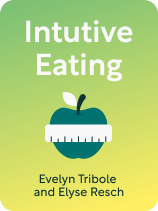

This article is an excerpt from the Shortform book guide to "Intuitive Eating" by Evelyn Tribole and Elyse Resch. Shortform has the world's best summaries and analyses of books you should be reading.
Like this article? Sign up for a free trial here.
Do you have an unhealthy relationship with food? How can you practice intuitive eating?
Diets can damage your relationship with food, making it difficult to fulfill your body’s nutritional needs and find pleasure in eating. In Intuitive Eating, dietician Evelyn Tribole and nutritionist Elyse Resch explore an alternative approach to dieting that promotes a healthy relationship with food and your body.
Continue reading to learn how to practice intuitive eating.
Promote Food Harmony by Tuning Into Your Body’s Needs
Tribole and Resch argue that the key to a healthy relationship with food is to learn how to practice intuitive eating: Tune out external influences dictating what you should eat and instead tune in to your body’s cues and cravings. This requires prioritizing internal signals of hunger, fullness, and satisfaction to develop a deeper understanding of your body’s unique nutritional needs and preferences. By embracing this understanding, you can make food choices that align with your body’s requirements, avoid feelings of deprivation, and experience the pleasure that comes from nourishing your body with satisfying foods.
(Shortform note: While research continues to explore the effects of this approach, studies suggest that it offers numerous health benefits. These include improved cholesterol levels, reduced BMI (body mass index), enhanced body satisfaction, and decreased levels of depression, anxiety, and restrictive eating. However, people with health conditions requiring dietary restrictions, such as high blood pressure or diabetes, should consult health care providers before adopting this approach.)
Tribole and Resch suggest four ways to tune in to your body’s needs:
- Stop dieting and accept your unique body.
- Listen to your body’s hunger and fullness cues.
- Prioritize food satisfaction over food morality.
- Find joy in moving your body.
Let’s explore their advice in detail.
Tip #1: Reject Diets and Accept Your Unique Body
The first way to tune in to your body’s needs is to stop dieting and accept your unique body as it is now. This requires letting go of the pressure to conform to a specific body size and instead prioritizing your overall physical, mental, and emotional health.
Because dieting interferes with your internal cues and compels you to focus on external factors like numbers on a weighing scale, Tribole and Resch recommend that you abandon diets and avoid anything that might cause you to fixate on your weight. Here are some ways to achieve this:
- Throw away your scale. (Shortform note: Many dieticians recommend this advice because weight constantly fluctuates due to factors like hydration, food intake, stress, hormones, and sleep quality—making the numbers on the scale meaningless for tracking overall health.)
- Delete diet apps and calorie counters, and get rid of dieting books. (Shortform note: Closely tracking your eating habits and weight-loss progress can elevate stress and cortisol levels. This not only disrupts the body’s ability to regulate hunger and fullness cues, but also undermines your physical health.)
- Unfollow influencers who promote dieting. (Shortform note: Research warns that even body-positive social media feeds can lead to self-objectification, shifting your focus from internal cues to external appearance. Therefore, fill your feed with non-body related content, like hobbies.)
Tip #2: Listen to Your Body’s Hunger and Fullness Cues
As you work on freeing yourself from the pressure to diet and conform to a specific body size, practice listening to your body’s hunger and fullness cues. Tribole and Resch say that this practice offers multiple benefits: It helps you notice and fulfill your hunger—which, in turn, prevents extreme hunger and curbs intense cravings, and it enables you to satisfy your body’s needs without falling into the trap of overeating.
The authors offer the following advice for tuning in to your body’s hunger and fullness cues:
1) Practice mindful eating by assessing your hunger levels before, during, and after each meal. This allows you to become more aware of how much and how often your body requires nourishment.
2) Pay attention to bodily sensations that indicate hunger, such as a grumbling stomach or low energy levels. When you experience a hunger cue, eat promptly to avoid excessive hunger—being too hungry makes it challenging to discern what food your body needs and when it’s had enough.
3) Ensure easy access to food by preparing meals and snacks in advance. This eliminates feelings of deprivation that trigger overeating because you can confidently stop eating when you’ve had enough, knowing that you can meet your body’s needs whenever hunger arises.
4) Consume food every three to four hours. This practice is particularly beneficial if you’ve lost touch with your body’s natural hunger cues—consistent meal patterns can help your body regain a reliable sense of hunger.
Tip #3: Prioritize Food Satisfaction Over Food Morality
Another essential way to tune into your body’s needs is prioritizing food satisfaction over food morality. This includes rejecting judgments and biases associated with food, focusing on how different foods make your body feel, and giving yourself unconditional permission to eat what you want without feeling guilty.
Tribole and Resch explain that shifting away from food morality helps you avoid the cycle of dieting, intense cravings, indulgence, and guilt. To overcome the cycle of dieting and negative self-judgment, they suggest focusing on how foods nourish and satisfy your body, rather than labeling them as “good” or “bad.” They recommend the following steps for achieving this:
1) List all of the foods that appeal to you and identify those you’ve been judging as “bad.”
2) Eat each of these so-called “bad” foods, paying close attention to how they make you feel physically. For example, you might identify fries as “bad” and note that eating more than a handful satisfies your taste buds but makes you feel bloated and lethargic.
3) Identify any judgments that trigger feelings of guilt or shame associated with eating these foods. For example, you might believe that fries have no nutritional value, leading to a sense of wrongdoing when consuming them.
4) Examine whether your judgments align with your body’s needs. For example, question why you believe fries have no nutritional value, if this belief truly benefits your well-being, and if fries can fulfill your physical needs when eaten in moderation.
5) Give yourself permission to continue eating the foods that make your body feel good, and allow yourself to savor the experience of eating them without guilt or self-judgment.
Tip #4: Find Joy in Moving Your Body
Up until now, we’ve focused on how tuning in to your body helps foster a positive relationship with food. Now, let’s explore how exercise—and finding joy in moving your body—can enhance this relationship.
Regular exercise provides numerous health benefits, such as enhancing mood, boosting energy levels, improving cardiovascular health, and increasing strength and flexibility. However, Tribole and Resch say that when you have an uncomfortable relationship with food, you may also have an uncomfortable relationship with exercise. You might view it as a punishment for eating and feel the need to overcompensate with extra workouts after indulging in treats. This negative association can affect both your relationship with food and your motivation to engage in and benefit from regular exercise.

———End of Preview———
Like what you just read? Read the rest of the world's best book summary and analysis of Evelyn Tribole and Elyse Resch's "Intuitive Eating" at Shortform.
Here's what you'll find in our full Intuitive Eating summary:
- Why eating is often associated with guilt, shame, and fear
- How diets damage your relationship with food
- Ways to cultivate a healthy relationship with food






